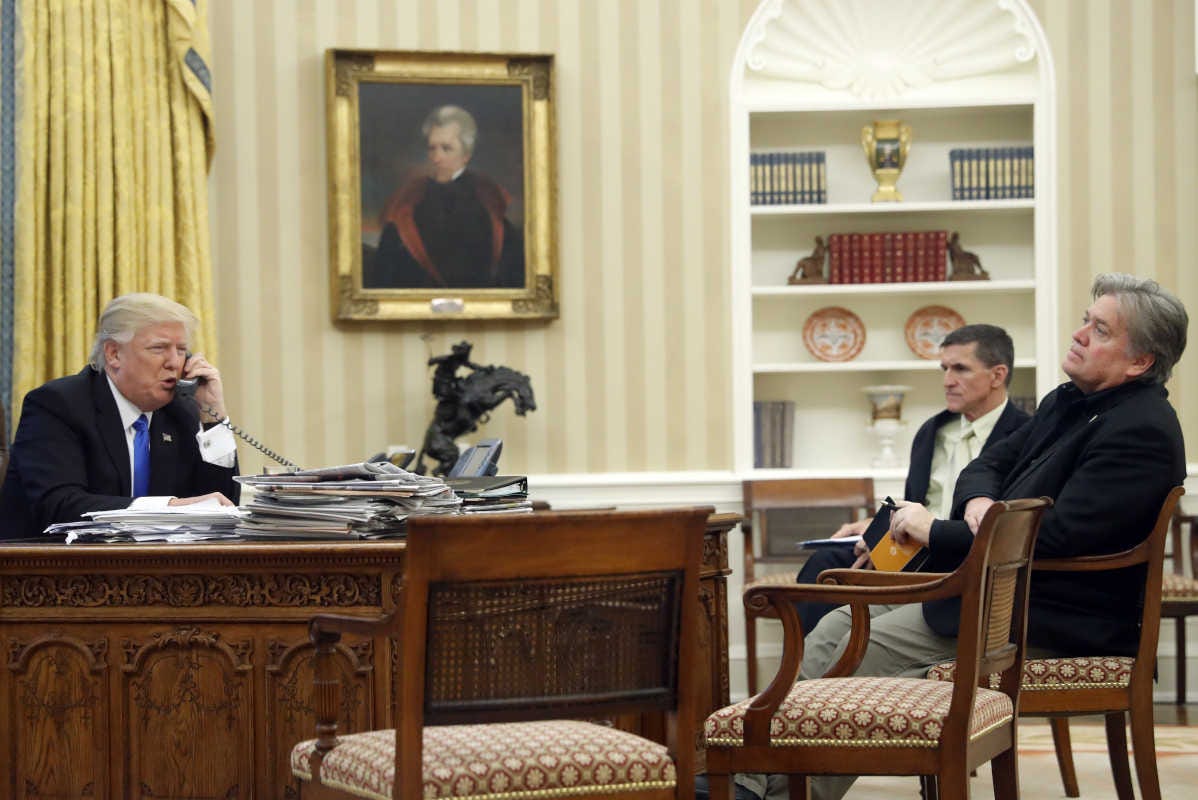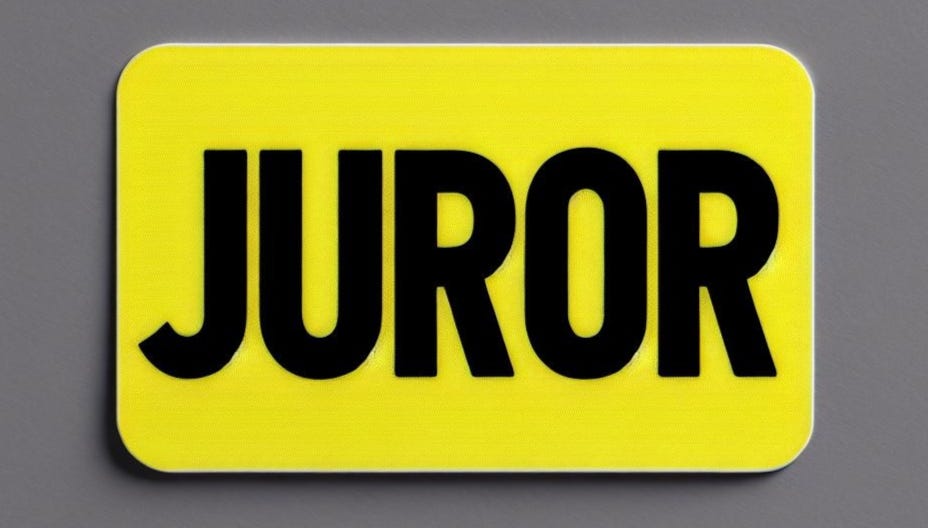A Timely Civic Reminder
How fulfilling a civic obligation became an anchor in chaos and a warning to heed
I stepped up to the counter and scanned my bar code just before 8:00 a.m. two Mondays ago. The receptionist checked my driver’s license before asking me to grab a bright yellow sticker from the stack in front of her and then sit in the waiting room around the corner.
I walked toward the rows of cushioned chairs anchored to the floor and facing the podium at the front of the room. More than 150 people were already spread across the room, situating themselves with the customary one or two seats between each other. Most peered downward at their phones; others crossed their arms and stared blankly forward as they waited. Almost no one talked.
Instead of following our normal weekly routines, we gathered for the same purpose, one that most of us appreciate in principle but bemoan when the invitation invades our mailbox. There’s never a convenient time to interrupt our margin-less schedules. Now, we all wore our bright yellow sticker with black, all-caps lettering that identified our status for at least that day—JUROR.
I picked a seat near the aisle after confirming that its built-in electrical plug worked, lest it become my base camp for the day. I opened my phone to read the morning’s news. Anxiety and frustration soon tightened my chest, a sensation that’s been common over the last few weeks as I mulled over the latest Trump administration actions.
While I disagree with the “what” of many actions, it’s the “how” that most troubles me.
One can make a case that we should review USAID’s international work, but immediately cutting off all grants and forcing domestic and global nonprofits to lay off staff, withhold medical treatments, and break promises to those they serve undermines human dignity and creates unnecessary collateral damage.
One can make a case for increased immigration enforcement, but rounding up immigrants who followed the asylum steps our country laid out for them, even during a church service with their family, undermines human dignity and creates unnecessary collateral damage.
One can make a case against the overreaches of certain diversity, equity, and inclusion (DEI) approaches, but scapegoating DEI and intellectual disability as possible causes for the D.C. plane collision without evidence undermines human dignity and creates unnecessary collateral damage.
One can make a case that we should reassess refugee resettlement programs, but refusing to follow through on commitments for families who just arrived from Afghanistan, Ukraine, and other war-torn countries undermines human dignity and creates unnecessary collateral damage.
One can make a case that we should review federal payments for fraud, but granting access to classified information to Elon Musk’s Department of Government Efficiency (DOGE) staffers without uncertain security clearances undermines human dignity and creates unnecessary collateral damage.
As the burden of thoughts like these weighed me down, I looked up from my phone as more jury candidates trickled in, filling empty seats between people like the C Boarding Group on a Southwest flight. In that moment, I realized something else that was also true about every person in that room: we were all voters.
If the room was a random sample of the county’s registered voters, three-fourths voted in November. Of those, 58% supported former Vice President Harris; 41% supported President Trump. While that distribution is more Democratic than Georgia and the nation, the room still held a full distribution of political views and interpretations of the events playing out in Washington.
Underneath the veneer of begrudging obedience to our civic duty, some jurors may have been worried that ICE might detain a family member while they waited in that room; others may have felt jubilance that immigration was finally being taken seriously. Some may have been considering whether to take the buyout offer from their federal government job as they juggle an abrupt return to the office five days a week, while others may have been relieved that wasteful federal government jobs were being cut. Some may have felt that the rollback of DEI programs would signal reduced job opportunities and increased racism in their day-to-day lives, while others may have felt freedom from rules that they felt had prevented them from job opportunities based on their race or gender.
And yet, in that room, we were all the same. We all watched the somewhat dated, 10-minute introduction video that placed jury service as a central feature of the United States Constitution. We all snickered as the bailiff made a joke about thanking us for being there even though she knew we didn’t have a choice. We all soon would raise our right hands to take an oath to tell the truth before answering questions about our qualifications, our past experiences, and our ability to render an unbiased opinion in a case.
While the hour-by-hour churn of new developments in Washington tempted me to stay glued to my phone, it was an important reminder that our local courts and governments continue to plod forward. Our institutions and laws have weathered severe tests in the past and emerged stronger. We’ve also made progress toward the founding ideals of our nation—the jury selection pool in that county courthouse during my parents’ lifetime would have only included white residents, regardless of the accused’s race. For a moment, hope returned.
Minutes later, though, I remembered the high-profile jury trial decided only blocks away from that courthouse in 1831. In that case, a jury convicted Samuel Worcester, an American citizen and Christian missionary to the Cherokee tribe, for refusing to either leave Cherokee territory (present-day northwest Georgia) or remain but swear allegiance to Georgia laws that stripped the Cherokee of land ownership, due process, and other legal protections. The judge sentenced him to four years of hard labor in prison, a decision that Worcester appealed to the U.S. Supreme Court alongside the Cherokee tribe. The court sided 5-1 with Worcester, overturning the conviction and invalidating the anti-Cherokee state laws as violating the U.S. treaty with the tribe.

But it didn’t matter. President Andrew Jackson defied the decision and expelled them anyway on the Trail of Tears, actions that undermined human dignity and became a black eye on our nation’s past. Northern members of Congress were afraid that enforcing the decision might cause states like Georgia to secede from the Union, so they didn’t intervene to stop Jackson (If you’re interested in a deep dive on this story, I wrote about it here in 2021).
It's no secret that Andrew Jackson is one of Donald Trump’s favorite presidents, respecting his strong executive action and his opposition to political elites. While president, he hangs Jackson’s portrait on the wall above the resolute desk in the Oval Office.

Right now, we’re seeing a flurry of abrupt executive actions, lawsuits in response, and court injunctions. Our nation’s founders set up our three branches of government to be in conflict as a check on power and personality. At some point, the Supreme Court will rule against the Trump administration. When that happens, will he submit to their decision, or will he follow Andrew Jackson’s example? If the latter, will Congress hold him accountable? I wish I was more confident in that answer.
Southbound readers come from all political perspectives, just like the jury waiting room I sat in two weeks ago. My point in writing this article isn’t to advocate for or against the Trump administration’s policy decisions, some of which I agree with and many of which I do not. November’s election decided that direction, and he is largely doing what he said he would do. Instead, I want to confront the cruel, callous, and short-sighted nature of his current approach.
It treats our allies like enemies and enemies like allies. It showcases headlines of egregious government waste but also cancels critical education research, jeopardizes classified information, and prevents life-saving medical treatments. It seeks to downsize the federal workforce but abruptly fires thousands of Americans with limited to no consideration of their performance or importance to their agency’s work. It claims to replace DEI with a merit-based approach but nominates cabinet secretaries with qualifications that demonstrate a new DEI test for hiring: Don’t Ever Impede (Trump). It seeks to retake the government for Christians but denigrates the very people Jesus calls Christians like me to love and serve.
I doubt these early victories will be worth the long-term collateral damage within our country and throughout the world. The adrenaline rush of breaking things will soon wear off, and blaming former President Biden will resonate less as time passes. President Trump will have to govern through the boring work of cleaning up the mess and building what’s next, albeit with a demoralized and smaller federal workforce as well as allies who no longer trust us.
In the meantime, engaging in our local institutions, like my jury service two weeks ago, can jolt us out of obsessive news consumption and help us see the people around us as fellow human beings worthy of dignity, regardless of how they voted or whether they can. At the same time, we must not take for granted that generations of progress toward a more just society can be erased if we prioritize loyalty to a leader over loyalty to human dignity and the rule of law.
Thank you for reading Southbound. If you liked this article, please click the ♥️ icon at the bottom of this post, leave a comment, or forward it to a friend. Doing so provides me with helpful feedback and helps others find the article.






Your good heart and your gifts of insight and expression are always an encouragement, Sam.
In the same vein, I wrote fan mail to a post office employee recently, praising him for exemplary
patience with and kindness to two international customers inept at the system yet desperate to
touch base with "home." We must all be diplomates on behalf of decency until the siege ends.
What a thoughtful, well-written commentary of the state of government in our beloved country. You touched the bases with honesty but without callousness. It would be wonderful to sit and talk with you.